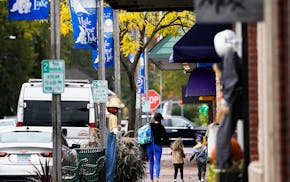At age 50, Philip Harder left a 21-year career in banking to pursue something different. It wasn't unusual for him. A year earlier, Harder had been president of the Minneapolis Urban Coalition, which was founded in 1968 as a response to racial strife in Minneapolis. It brought together minority communities, nonprofits and the town's top corporate leadership in a collaborative effort that had not been seen before or since.
Harder who earned a reputation "as a man who would roll up his sleeves and dive into whatever work needed doing," died April 16 from complications of pneumonia. He was 92.
During his tenure at the Urban Coalition, his accomplishments belied the stereotype of the white-guy banker from Wayzata.
He pushed the Minneapolis police and fire departments into minority hiring drives. When two police officers were involved in the shooting of a 13-year-old boy, Harder and other members of the coalition investigated and came back with the determination that the cops should be disciplined. At the same time, he negotiated with community activists from the city's restive North Side. At the start of one meeting, Harder's son recalled being told, a handgun was put on the negotiating table and pointed in the direction of his father.
"That was part of the negotiating tactic that members of the community used because they were weary of business's involvement," said his oldest son, Phil Jr. "There was a great deal of turmoil, the city was in flames. Passions were really high. That just touched Dad in a unique way."
Harder embodied a unique spirit of corporate responsibility. He set up an office on the city's North Side after riots rocked the community. He oversaw task forces on minority businesses and housing discrimination that helped launch organizations that remain to this day.
"He learned a great deal and it affected how he felt and thought about those issues in a very positive way," said longtime community activist and former Minneapolis school board member T. Williams, who is working on an oral history looking at Minneapolis during the period when the Urban Coalition was operating.
"It had an impact on these corporations on their recruitment and hiring practices. Around that table, constantly, those issues were being elevated and the question was being raised, 'Take a look inside your own businesses,' " Williams said.
Harder was born in New York City in 1920. He joined the merchant marine and patrolled the East Coast for the Coast Guard on donated sailboats, listening for enemy submarines with primitive sound gear. Later he participated in the D-Day invasion of Normandy as commander of a landing craft at Sword Beach.
Following World War II, he began his career as a stockbroker. In 1948 he moved to Minneapolis to raise a family and pursue a career in banking. In 1950 he joined the First National Bank of Minneapolis as an assistant cashier and rose to senior vice president and director.
In 1970 Harder was elected president of the Minneapolis Urban Coalition. In 1971, with his one-year term concluded, Harder resigned from the bank to pursue his interests in change and social justice. He became the coordinator of a continuing education program at Carleton College called "The Carleton Seminars in the Liberal Arts."
After his stint at Carleton, Harder returned to banking as president and chief operating officer of Farmers and Mechanics Savings Bank of Minneapolis, where he finished his business career.
He is survived by his wife of 68 years, Margaret Shepard Harder; his two sons, Phil Jr. and Shepard; his sisters Cynthia Murray and Jennipher Parr; his brother-in-law Jim Shepard, and three grandchildren. Services have been held.
Mark Brunswick • 612-673-4434

Shop the curbs for free on 'Trash to Treasure Day' in White Bear Lake

Longtime Uptown boutique closing in May

Meet the Athena Award winners: 103 female athletes honored by their schools

Lacrosse lists: 21 top players and the school that's No. 1 for boys and girls

